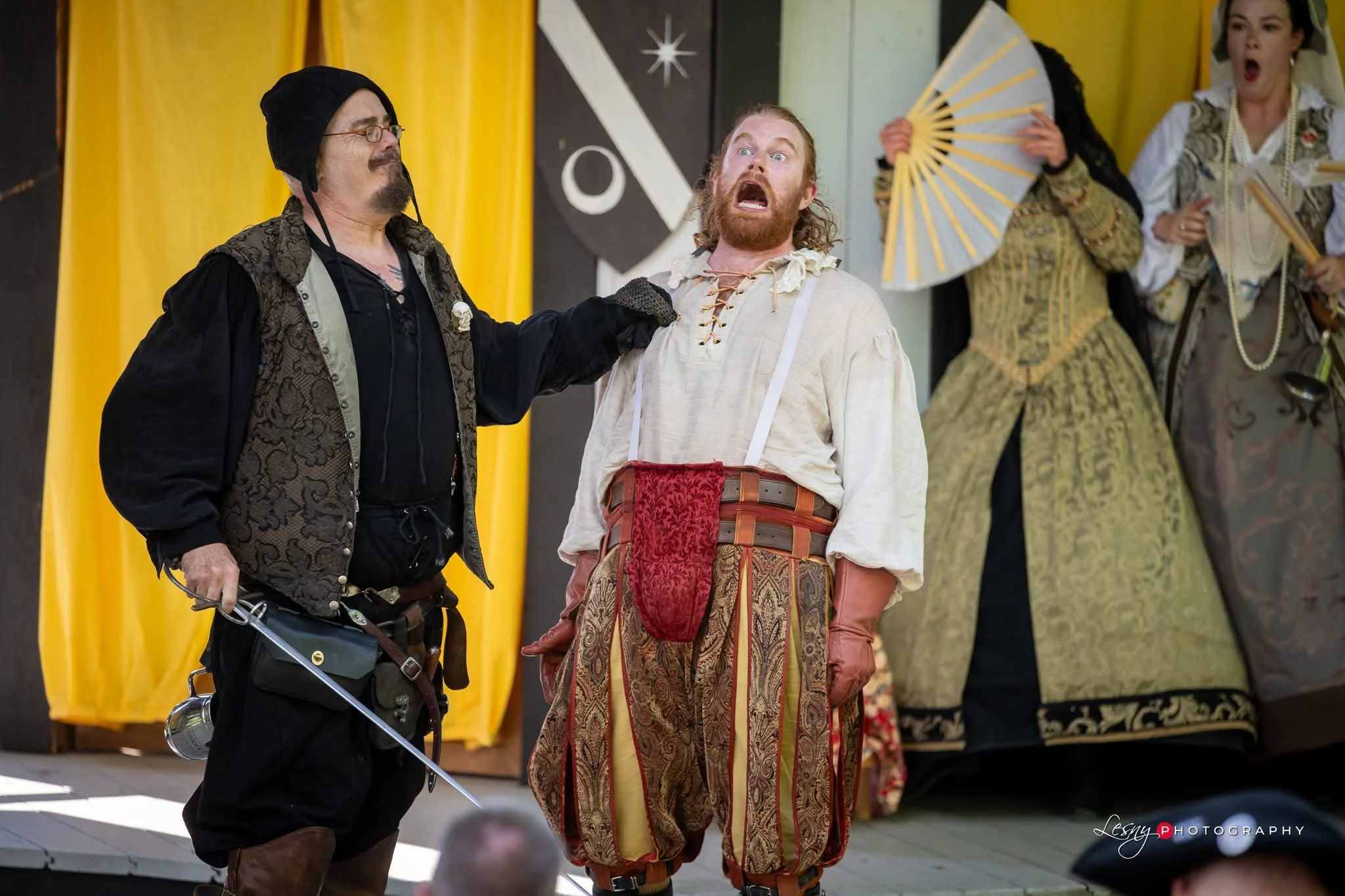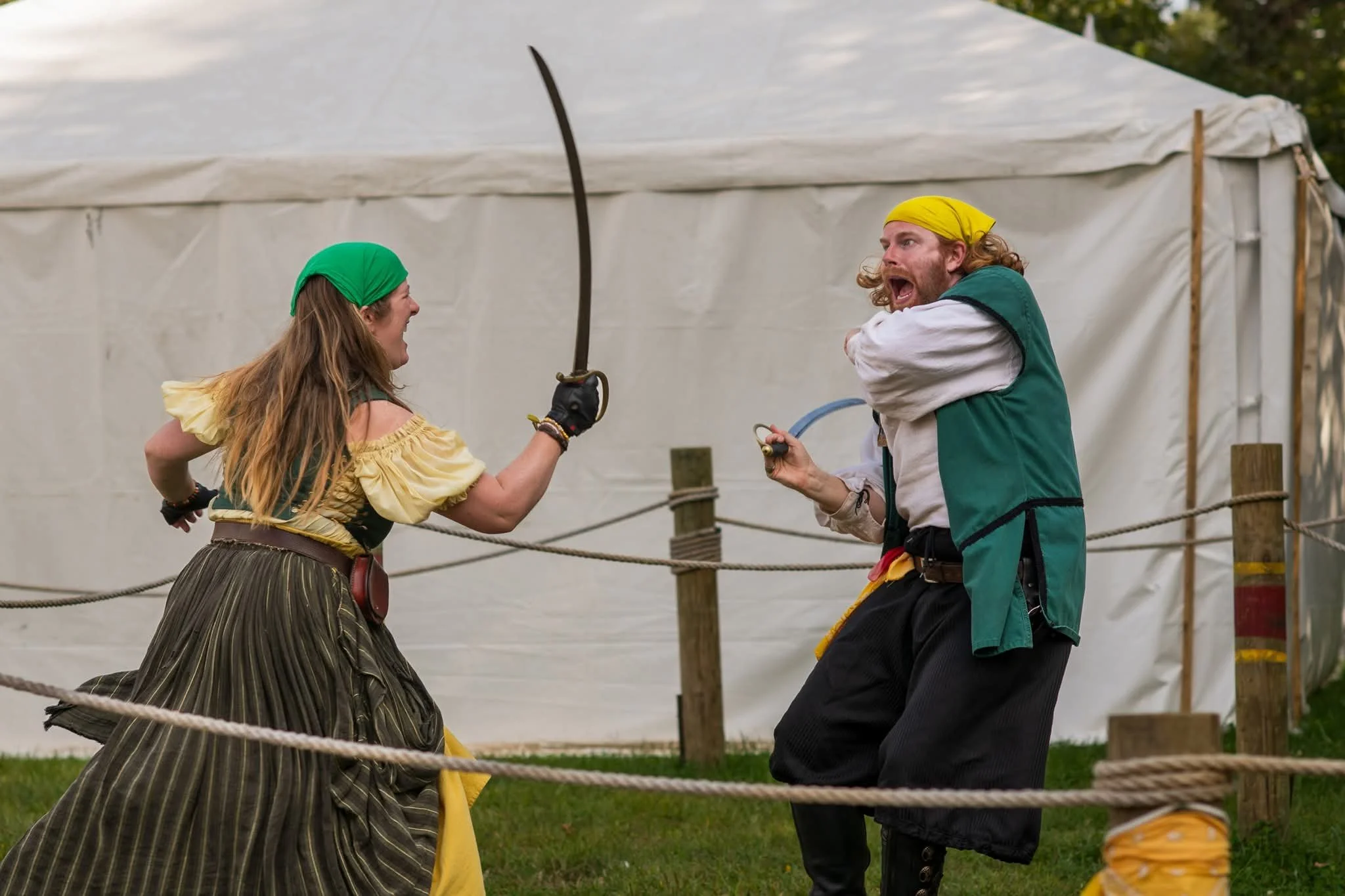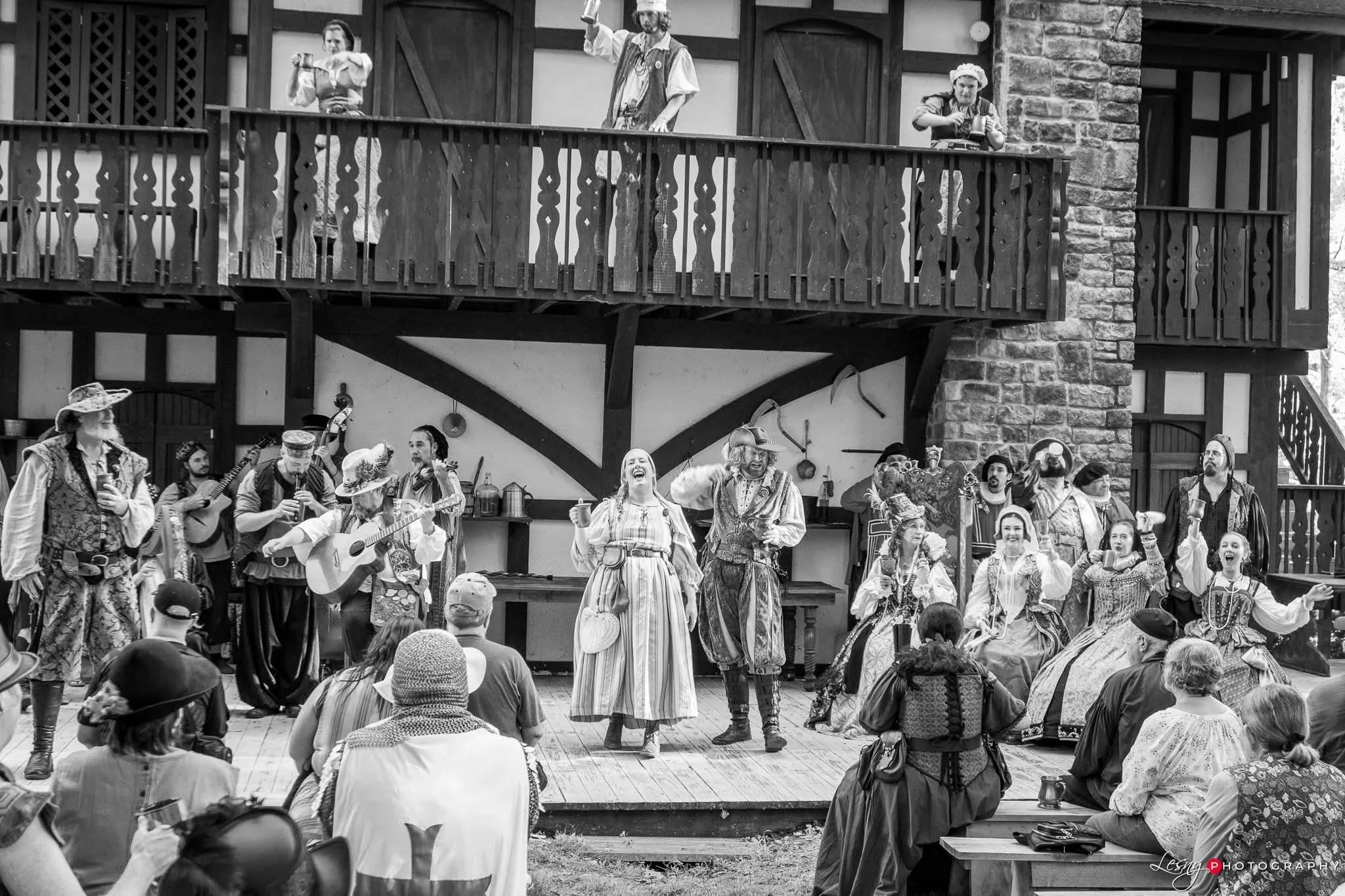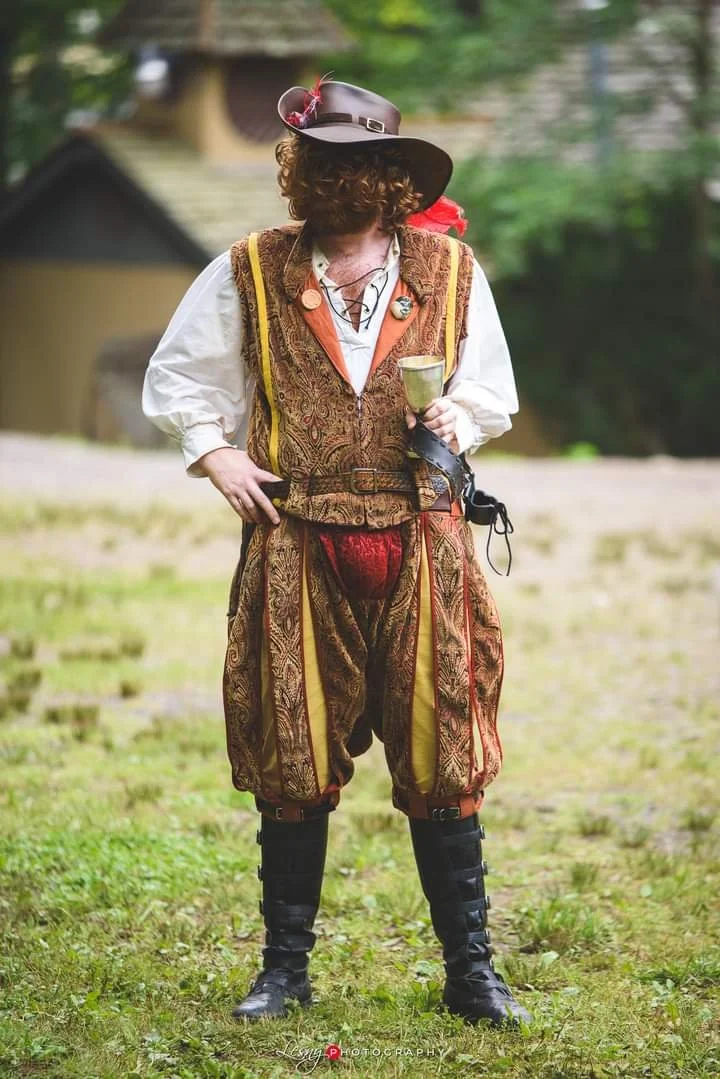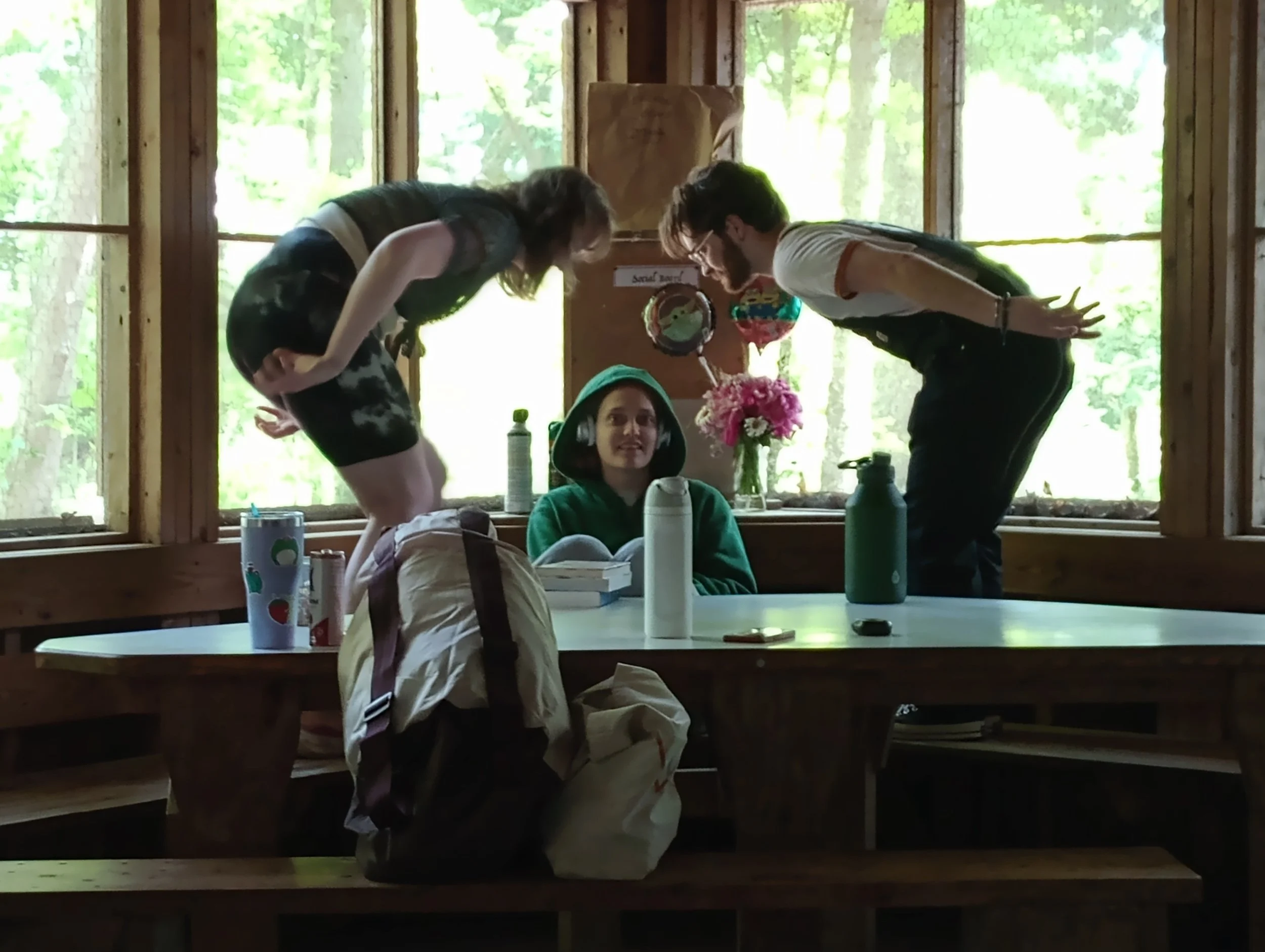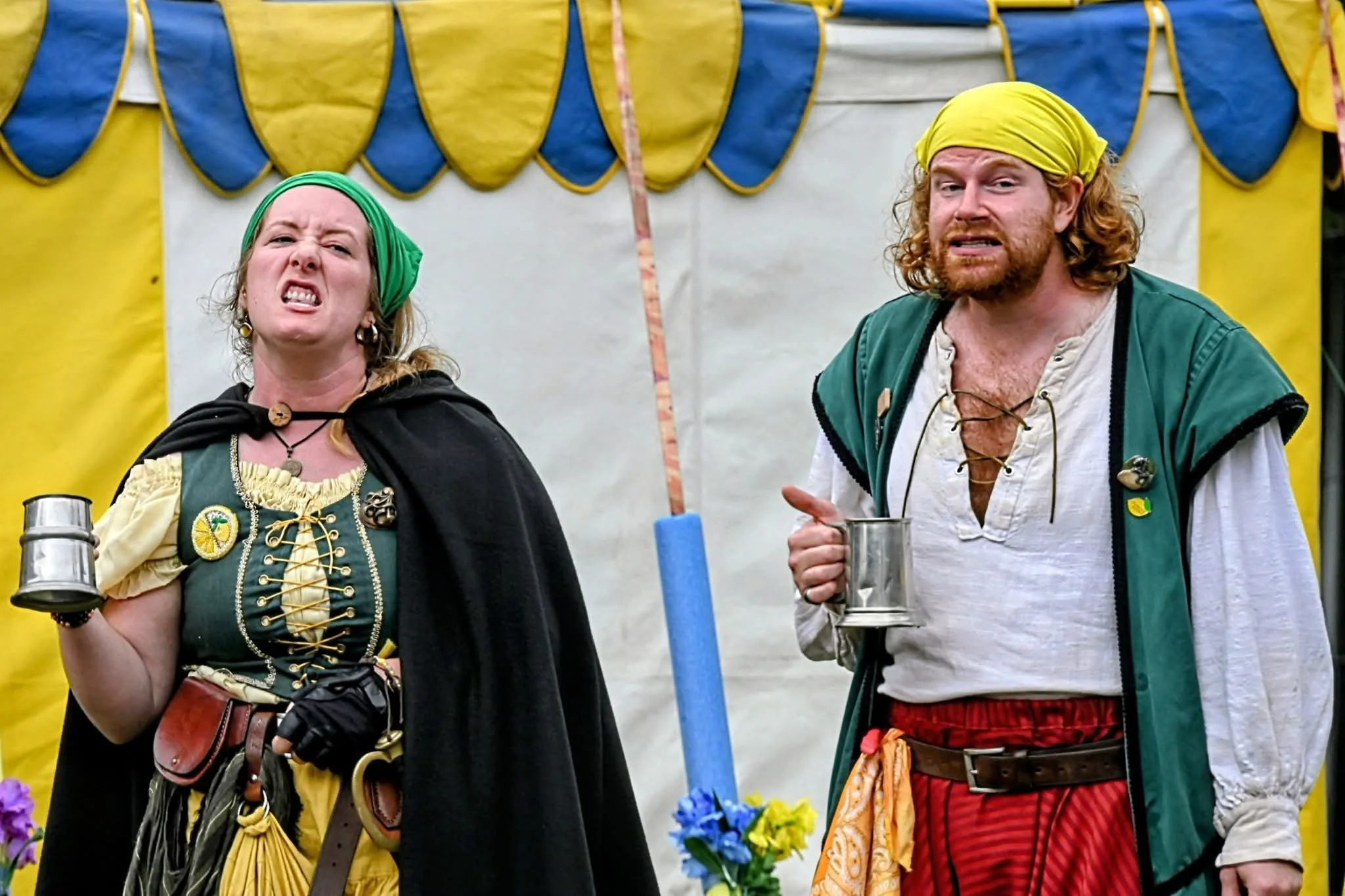sent from the middle of the woods (What I Actually Do as a Ren Faire Performer)
(Preview photo ©Andrew Lesny, 2025)
The work is play and the play is the work.
I didn’t expect to spend this much of my professional career running around the woods being British. Mayhap others could have with all the Monty Python I took in as a nipperkin (child), but I didn’t see it coming.
My paps (nipples) didn’t either…
©Andrew Lesny, 2025
But I’ve, in fact, been doing this for as long as Alli and I have been together. Often with her! We met at Cedar Point (and fell madly in love) as a part of the now-defunct Forbidden Frontier on Adventure Island, a frontier-themed interactive attraction that was essentially family-friendly Westworld. I was still British.
©Scraggy, Joshua Ferguson, Andrew Lesny, 2021 - 2025
For those paying way too much attention, that’s six years with no signs of slowing. So I figure I owe those same people some more insight on what the hell she and I actually do when we disappear from the internet and modern society for a third to half of the year.
It’s quite close to genuinely running away with the circus.
It’s Also the Closest We Get to Grad School…
Our home faire, the Sterling Renaissance Festival, is widely considered one of the “crown jewels” of the circuit. One of the biggest reasons for this is its in-house acting troupe, the Wyldewood Players, which serves as the oldest full-time professional company working in the Ren Faire world.
We take our training very seriously.
The phrase, “work hard, play hard,” comes to mind. In all definitions of the words. We spend most of June every year rehearsing.
Hold on, Prillaman(s). Rehearse? There’s no script, right? Not really. We do shows (we call them scenarios) throughout the day that are usually more scripted faire (pun?), but for a majority of the nine-hour day, we’re wandering around the lanes and roads, improv-ing out of our asses. So how the hell do you rehearse improv?
I’ll tell you! It’s kind of like how you get to Carnegie Hall. You take a taxi. Or the subway. We typically take cars to get to site.
Sorry, wait, I mean practice. We just practice. It’s like private Whose Line Is It Anyway?, but with less (or more?) stakes, and after the exercise, we dissect it. The performance mind is a muscle, one that must be stretched like any other in the body.
We spend three weeks building an ensemble from the ground up. Some folks are veterans to the process; others are going through it for the first time. But through concentrated study of improvisation and interactive technique, dialect and language training, Elizabethan style work, we slowly create living, breathing characters of yore. It’s a process developed by the man who wrote the book himself, Gary Izzo, and it’s what most interactive and streetmosphere experiences today base themselves off of (you know, Disney, or what Cedar Point tried to do, but we didn’t find out how fully they beefed it until our first year here).
It results in a joyous, performance-focused actor summer camp vibe. It’s the kind of special you really feel when you’re there in it, and it’s 100% a privilege to escape the madness of the contemporary world and straight up play with other people.
Because even though the audience has likely never been to school for it, play is still an instinctual thing, and interactive theatre invites them as humans to tap that well and get silly. It’s really the biggest difference compared to a scripted show. The level of power and influence the audience has over the play is insane.
And it is on purpose.
What We Talk About When We Talk About Interactive Theatre
I’m perhaps not dispelling a myth by saying this, but there is a much a better word for “interactive” for what we want to say and mean by it than the word itself. And that word is…
…drum roll please….
Immersive.
Actors’ faces when on the wrong side of audience participation.
©Kit Catlett, 2025
All immersive theatre is interactive. Not all interactive theatre is immersive. A great example of this is the dreaded practice of audience participation.
When an audience member exchanges words with an actor onstage, by definition that’s interaction. But it’s not necessarily immersive. Because despite any improv going on, such interaction is still usually a semi-scripted experience. The actor is still guiding the whole back-and-forth, and sooner or later will return the story to the script. Sometimes the audience member talking is even a plant! Remember, art is a lie. Nothing is real.
These moments give an audience the illusion of control when they don’t actually have it, and that stricture defeats the ability of the audience to fully immerse themselves into the world. In an immersive experience, the entire environment is the stage. There is no audience. Everybody is a character in the same world. Warwick, 1585. Forbidden Frontier, 1917. The Sleep No More shit. Even in a building, the guests/patrons have the freedom to choose where they go and what they see.
Want to help Sir Francis and Lady Dorothy mess with Sir Walter Raleigh? Or help Commander Etta arrest a map-thief? Want to shop and have nothing to do with any of the actors because is there truly anything more insufferable than a thespian? Go for it. It’s a true choose-your-own-adventure, where you’re curating your own experience in real-time. It’s endlessly entertaining. Because it’s never the same day twice. You encounter all manner of people.
Everybody Plays at a Different Level
Everyone who walks by, everybody we walk by…we’re (while fully in character) sizing ‘em up.
The only thing that happens every day is a nipple twist.
©Andrew Lesny, 2024
Every immersive actor has a little, metaphorical bag filled with tricks: openers, one-liners, bits, lazzi, concetti. All these things are designed to attract attention and curiosity. Or we’ll approach you with some emotion and a calculated need. We give you a little offer of play. How you, our scene partners, respond, will influence where we go from there. If you give us pretty much any damn idea, we’ll run with it. Hard. We also might wind up just chatting. Me and a few folks once let someone take us beat-by-beat through the plot of The Princess Bride for 20 minutes, and we were all having a great time. It was an honor, actually.
Some guests like to jump straight into a bit and get messy. Others like to observe others doing so. Sometimes folks want to play, but don’t quite know how and need a little coaxing or encouragement. We train in rehearsals (as much as we can, you do learn a lot of this by actually doing it, baptism-by-fire) for adapting our approach dependent upon who we’re encountering at any given moment. Sometimes you never see people again. Sometimes, you run into them all day and you build your own camaraderie and story together.
And, of course, some people just straight up don’t want to play. That’s okay, too. There’s a lot of room around. It’s an incredibly consent-forward environment, because if you’re not feeling it…you can walk away. Hell, WE can walk away if it gets weird. Bad weird. Good weird is the point.
This Is (Supposed to Be) Fun
Theoretically, watching a play is rad as hell. A lot of people become performers because, for them, doing the play is even more so.
Just as the format of interactive/immersive theatre gives the audience the most freedom, so it gives us as actors. One of my favorite things about it is that the storyline is often much broader. The Queen is visiting Warwick. Boom. And in that setting, we build the rest of the story through the silly, weird, intimate moments we discover together. Moments that often are unique to specific individuals or days.
It’s the kind of job where you wake up every morning and say,
“…what do I want to do today?”
How many people can I get to rub my fish prop on their arm so they can smell like the sea? What if me and a bunch of kids turn all of the Garrison furniture upside down? Alli once lifted a woman who then lifted her in return. One time I went into witness protection and got to finally change my accent for a time. The only limits are everyone’s collective imaginations.
At its heart, interactive/immersive theatre is the sandbox. The open-world video game. Its entire purpose is collaborative (and literal) play.
And playing is just fun. Remember fun? When was the last time you had fun? In today’s economy? Was it when you were a kid? Actors are just professional children. I quote Ally Sheedy in The Breakfast Club, “When you get older, your heart dies.” A Ren Faire firing on all cylinders keeps that from happening. One interaction at a time. One tableau at a time. One pap twist at a time.
Caption this photo.
©Andrew Lesny, 2025
The majesty and privilege of that is certainly why I have yet to stop.
